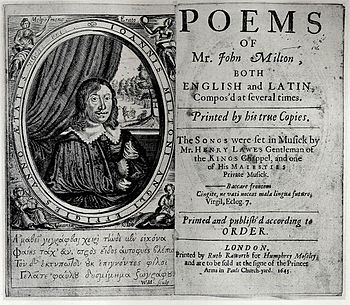- Milton's 1645 Poems
-
Titlepage to 1645 Poems, with frontispice depicting Milton surrounded by four muses, designed by William Marshall

Milton's 1645 Poems is a collection, divided into separate English and Latin sections, of the poet's youthful poetry in a variety of genres, including such notable works as An Ode on the Morning of Christ's Nativity, Comus, and Lycidas. Appearing in late 1645 or 1646 (see 1646 in poetry), the octavo volume, whose full title is Poems of Mr. John Milton both English and Latin, compos'd at several times, was issued by the Royalist publisher Humphrey Moseley. The volume's frontispiece contains an extremely unflattering portrait of Milton by the engraver William Marshall, under which Milton placed satirical verses in Greek denying any resemblance. In 1673, a year before his death, Milton issued a revised and expanded edition of the Poems.
The book was published in 1646, according to The Concise Oxford Chronology of English Literature, notwithstanding the book's title page.[1]
Contents
Organization
In addition to the first titlepage, the volume contains separate titlepages for the Latin Poemata and Comus (a.k.a. A Mask). There are also five sonnets and a Canzone written in Italian language that are not separately denoted. The order of the English poems is as follows:
- On the Morning of Christ's Nativity
- A Paraphrase on Psalm 114
- Psalm 136
- The Passion
- On Time
- Upon the Circumcision
- At A Solemn Musick
- An Epitaph on the Marchioness of Winchester
- Song on May Morning
- On Shakespeare
- On the University Carrier [Hobson's Epitaph]
- Another on the Same
- L'Allegro
- Il Penseroso
- Sonnets 1-10
- Arcades
- Lycidas
- A Mask [Comus]
The Latin poems are divided into "Elegiarum" (Elegies) and "Sylvarum Liber" and conclude with the Epitaphium Damonis, a poem mourning the death of Milton's best friend, Charles Diodati. In terms of themes and organization, this section "balances and speaks to the English collection."[2]
Significance
Though many of these poems are marvels in their own right, critics are divided on how to read the volume as a whole in the scope of Milton's entire poetic career, which is invariably seen as culminating in the epic poem Paradise Lost. Taking a quote from Vergil's Georgics, Milton identifies himself as a "future poet" on the title page. Some commentators take this as evidence that Milton was self-consciously preparing himself for a greater work.[3] Others, on the other hand, argue that Milton's self-presentation is of "a plural and shifting subject" whose poetic trajectory is not set in stone.[4]
It is also debatable to what extent the volume embraces the republican politics Milton had begun to adopt by this time. Milton's publisher, Moseley, supported Royalist poets, such as Edmund Waller, and the volume contains praises of aristocrats and traditionally Royalist forms, like masque.[5] Yet a strong argument can be made that Milton did subtly inscribe his radical Puritan politics in the Poems through such works as Lycidas.[6]
See also
- 1646 in poetry
References
- ^ Cox, Michael, editor, The Concise Oxford Chronology of English Literature, Oxford University Press, 2004, ISBN 0-19-860634-6
- ^ Stella Revard, Milton and the Tangles of Neaera's Hair (Columbia: University of Missouri Press, 1997), p. 1.
- ^ Louis Martz, "The Rising Poet," Chapter 2 in Milton: Poet of Exile, 2 ed. (New Haven: Yale University Press, 1980), pp. 31-59; C.W.R.D. Moseley, The Poetic Birth: Milton's Poems of 1645 (Aldershot: Scolar Press, 1991).
- ^ Colin Burrow, “Poems 1645: the future poet,” Chapter 4 in The Cambridge Companion to Milton, 2 ed., ed. Dennis Danielson (Cambridge: Cambridge University Press, 1999), pp. 54-69.
- ^ Thomas Corns 'Milton's Quest for Respectability,' Modern Language Review 77 (1982): 769-79.
- ^ Michael Wilding, "Milton's Early Radicalism," Chapter 4 in John Milton, ed. Annabel Patterson (London: Longman, 1992), pp. 39-45; David Norbrook, "The Politics of Milton's Early Poetry," Chapter 5 in ibid.
External links
Categories:- 17th-century poems
- Early Modern English poems
- Poetry by John Milton
Wikimedia Foundation. 2010.

